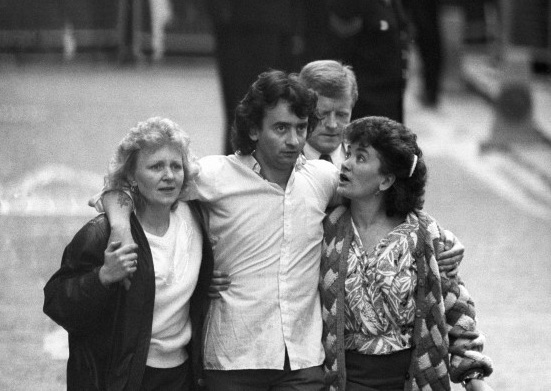
More than 1,000 files on the Guildford Four, Maguire Seven and Birmingham Six, notorious miscarriage of justice cases involving innocent Irish civilians living in England, are to remain secret almost a century longer than they were supposed.
The files were due to open on Wednesday, but are now closed for either 84 or 100 years from their original date. The new opening dates range from the 2050s to the 2090s.
The files are are from a five-year inquiry by retired judge John May that took place between 1989 and 1994 into the wrongful convictions.
Campaigners for the Guildford Four -- Paul Hill, Gerry Conlon, Paddy Armstrong and Carole Richardson -- believe they show that very senior figures were involved in concealing evidence of their innocence for political reasons, and that May’s inquiry was a cover-up.
British barrister and Conservative politician Michael Havers, who represented the Crown in the trial and appeal of the Guildford Four and the Maguire family, later became Attorney General under Margaret Thatcher.
Richard O’Rawe, a former republican prisoner who grew up with the late Gerry Conlon (pictured, centre), one of the Guildford Four, said the secrecy involved was a disgrace.
He said: “Somebody has examined every one of those files and decided that every one of them is damaging and every one of them would reveal those who were involved with the Guildford Four knew they were innocent from the get-go - and if this is anything, this is proof.”
There were also fears that some files have been newly tampered with or even destroyed. Retired lawyer Alastair Logan, who represented the Guildford Four and campaigned for the files to be opened, said there was now no way to know if the files are still intact following their removal and examination.
In addition to the secret files on Guildford, there are also sealed files on the Birmingham Six - Paddy Joe Hill, Hugh Callaghan, Gerard Hunter, Richard McIlkenny, William Power and John Walker – another miscarriage of justice case from the same era of the mid 1970s.
Christopher Stanley, from KRW Law, which is representing families in both cases, said he was “sadly unsurprised” that the British government had displayed the level of secrecy it had. He said the reasons for the decisions had to be challenged - both in the public interest and in the interests of relatives of victims and survivors.
He said the failure to disclose historical records fuelled suspicion and “certainly does not comply with openness and transparency demanded by the outworkings of the legacy of the conflict”.
According to diplomatic papers released separately this week, the British government admitted to Irish officials that it was afraid to release the Birmingham Six because it would cause a “scandal” in the tabloid press; and because of pressure from right-wing Tories, who wanted the men to remain in jail regardless of their innocence in order to protect the reputation (in their eyes) of the British judicial system.
In 1989, top Tory David Lidington insisted that “the Birmingham Six look more guilty than the Guildford Four”, but was more concerned about any appeal embarrassing the British. Lidington asked the Dublin government not to make “triumphalist” statements if a decision was made in favour of the Guildford Four’s case being referred to the Court of Appeal. It was a “very delicate” matter, he said.
He added that the mood in the Tories was “very bloody on capital punishment and very bloody at the moment on ‘Irish terrorism’ (as they would describe it)”.
Papers released in Dublin also reveal that in a meeting with former Fine Gael TD Peter Barry, Birmingham Six’s Paddy Hill noted the Irish embassy and Irish government had not shown any interest in their case until a decade after their conviction. He told the minister he wanted a statement from the Taoiseach saying they were innocent and to take the case to the European Court of Human Rights. However, both Fianna Fail and Fine Gael governments refused to do.
After the Guildford Four were released in October 1989, their lawyer Gareth Peirce told a 26 County government official she was “incredibly angry” it had taken 15 years to have their convictions quashed. She alo believed that the English police had deliberately suppressed alibi evidence for Mr Conlon, which she believed would have emerged if a court appeal had proceeded. It collapsed suddenly when the Crown stated that it did not wish to support the convictions.
In a private note, the Irish official said: “Ms Peirce thought that if there was something of which she was not aware, it must have been ‘excruciatingly embarrassing’ evidence that they did not want to come out in open court.”
![[Irish Republican News]](https://republican-news.org/graphics/title_gifs/rn.gif)
![[Irish Republican News]](https://republican-news.org/graphics/title_gifs/harp.gif)

